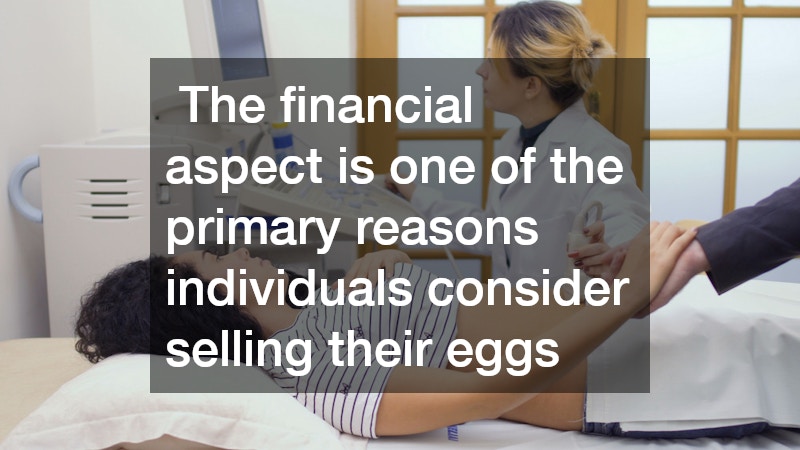Egg donation is a complex and multi-step process that involves careful screening and medical procedures. For those considering selling their eggs, it is crucial to understand what the process entails. Typically, female donors go through an intensive screening procedure, which includes medical, psychological, and genetic evaluations. This ensures the donor’s health and the quality of the eggs. Being fully informed of the process helps in making an educated decision about whether searching ” selling my eggs” is a suitable choice.
Once selected, the donor must adhere to a strict medication regimen to stimulate the ovaries. This often involves daily hormone injections over a period of two to three weeks.
The medications increase egg production, allowing for multiple eggs to be harvested during the retrieval procedure. The final step involves a minor surgical procedure where the eggs are retrieved under sedation. Despite the surgical aspect, egg donation is considered safe, but understanding potential risks is essential for any prospective donor.
The time commitment and procedure can be daunting but rewarding financially. Many women choose to donate as a means of helping others while receiving compensation. It’s important to be aware that not everyone qualifies, and the process can be both physically and emotionally taxing. Psychological support is typically provided to ensure donors are comfortable throughout. This complexity underscores the importance of seeking programs with reputable clinics and supportive staff.
Financial Compensation for Egg Donation
The financial aspect is one of the primary reasons individuals consider selling their eggs. Compensation can vary significantly based on several factors, including the geographical location of the donation center and the donor’s unique characteristics. Typically, egg donors can expect to receive anywhere from $5,000 to $10,000 per donation cycle. In some cases, especially involving agencies that require specific traits, compensation can exceed these figures. Understanding the compensation structure is essential for anyone seriously considering this option.
Egg donation compensation also reflects the time and physical demand placed on donors. Travel and any associated expenses are often reimbursed, which provides additional financial incentives. Typically, compensation is awarded after the retrieval process is successfully completed. Potential donors should be aware that while financially rewarding, the compensation should be secondary to the primary intention of aiding families. Understanding that each donation cycle’s compensation may slightly differ is crucial when planning financially.
The emotional satisfaction of helping someone create a family is often a non-monetary but invaluable aspect of egg donation. Many donors express a sense of fulfillment and gratitude knowing they have contributed to bringing life into the world. Financially, donating eggs can provide significant benefits, including paying off debts, funding education, or bolstering savings. Women should weigh both the financial and altruistic reasons before deciding to proceed. The blend of financial and personal reward makes egg donation an attractive option for many women.
Risks and Considerations
Despite the financial incentives, there are risks and considerations associated with egg donation that should not be overlooked. Hormonal stimulation can lead to side effects such as mood swings, bloating, and cramping. More severe complications, although rare, include Ovarian Hyperstimulation Syndrome (OHSS), which can result in serious discomfort and requires medical attention. Aspiring donors should consult with healthcare professionals to fully understand the risks involved. This helps in making an informed decision about whether selling your eggs aligns with personal health and life goals.
Ensuring that the decision to donate eggs comes from a place of comprehensive knowledge and understanding is vital. Psychological evaluations help assess the emotional readiness of the donor. They also ensure that the decision is being made freely and with a clear mind. Emotional attachment is generally minimal given the anonymity and structure of the program, but counseling is often available to navigate any unexpected feelings. This preparation and support network can help mitigate any emotional risks involved in the process.
Potential donors should also consider the legal aspects associated with egg donation. Contracts delineate the rights of the donor and the recipients, safeguarding all involved parties. It’s recommended to seek independent legal advice before committing to the process. Understanding these legal bindings helps achieve peace of mind, ensuring both donor and recipient parties have clear expectations. Thorough knowledge of all legal implications can also enhance the donor’s confidence in proceeding with such an impactful decision.
Selling your eggs can be a rewarding endeavor, both financially and emotionally. The process is complex and requires a significant time commitment and medical procedures. Given the financial compensation, careful consideration of risks and understanding the intricacies of the process provide a clearer perspective for potential donors. Many donors find they receive far more than just financial gain, with a fulfilling experience of helping others achieve family growth. With the right approach, donors can ensure that their participation in this life-changing procedure is carried out smoothly and rewarding for all parties involved.
Understanding the nuances involved, from medical procedures to legalities and compensation, ensures that those considering selling your eggs do so with the full picture in mind. Acknowledging both the tangible and intangible benefits reinforces this decision. For many, the notion of helping families while receiving substantial compensation provides significant motivation. It remains a personal choice, necessitating thoughtful consideration and a keen understanding of the facts and responsibilities. In navigating this journey, prospective donors can achieve personal satisfaction and contribute to the miracle of life.


